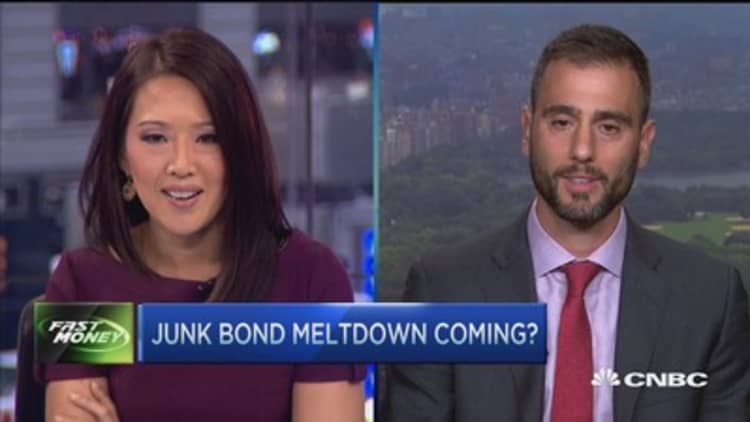
Billionaire investor Carl Icahn has long warned about the dangers of the high-yield market. Now, those sentiments are being echoed by a top strategist at a major bank who called the market for riskier bonds a "slow-moving train wreck."
In an interview on CNBC's "Fast Money," Michael Contopoulos, head of high-yield strategy at Bank of America, called high yield credit a "big, big problem," and laid out the reasons why a turn in the credit cycle is currently underway.
The dramatic rout of commodity prices is having a spillover effect on corporate bonds, especially those linked to energy. Last week, ratings agency Standard & Poor's said the speculative-grade corporate default rate jumped to 2.5 percent in September, its highest level since 2013. That figure is expected to rise to nearly 3 percent by the middle of next year, S&P added.
Read MoreThe party is over for junk bond investors
"You're going to see defaults pick up," Contopoulos said. "This isn't just a commodity story, this isn't just metals and mining and energy. It's broader than that. And the fundamentals are as poor as we have seen them."
The has dropped nearly 5 percent in the past month, and is down more than 10 percent so far this year. On Friday, the ETF hit a 52-week low on an intraday basis.
This can't go on forever
The lower oil prices go, the more stress is being placed on the high-yield bond sector. Evidence is mounting that the outlook is unlikely to improve anytime soon. Last week, ratings firm Moody's said its high-yield Liquidity Stress Index fell in September amid a rash of energy company downgrades.
Meanwhile, in a recent note, Contopoulos wrote that 50 percent of sectors in Bank of America's high-yield index have had negative price returns for the past five months in a row. "That's the longest such streak since late 2008," he said.
A large part of the weakness over that period, he said, can be attributed to the end of the Fed's quantitative easing program.
The excess liquidity from the Fed's massive bond buying and super-low interest rates "have created an environment where high yield corporates have been able to gather funding at incredibly cheap levels," Contopoulos said. "At some point, unless you have meaningful earnings, you can't sustain incredibly high leverage indefinitely."
Since the Fed started tapering its bond purchases, Contopoulos said about $30 billion has flowed out of the high yield bond market. "Many of the weak hands have already been flushed out to the market, but that doesn't mean that you can't still have price loss," he said.
However, Contopoulos contended that the problem is much bigger than retail cash leaving the junk bond market. "This is fundamentals, and that actually, I would argue, is much worse, because it takes it from a technical story to a fundamental story."
As for when the train wreck could turn into a full-on catastrophe, Contopoulos said it's likely to be a slow-moving process. "I don't think this necessarily turns into a disaster overnight, it's probably death by a thousand cuts and a multi-year weakness in the asset class."




